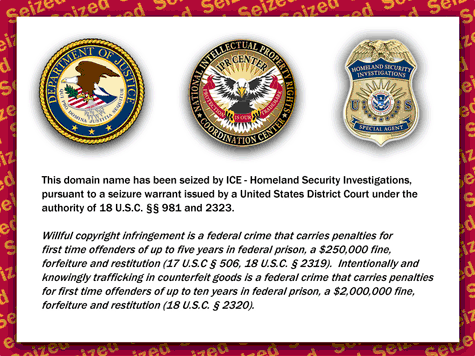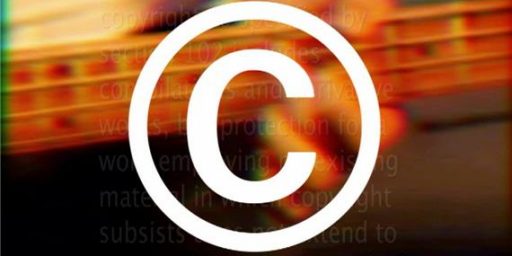Feds Seize Domain Names
In an effort to combat illegal file sharing, the US Department of Homeland Security is seizing domain names.
In an effort to combat illegal file sharing, the US Department of Homeland Security is seizing domain names. Sara Jerome for The Hill:
The investigative arm of the Homeland Security Department appears to be shutting down websites that facilitate copyright infringement.
Immigration and Customs Enforcement (ICE) has seized dozens of domain names over the past few days, according to TorrentFreak.
ICE appears to be targeting sites that help Internet users download copyrighted music, as well as sites that sell bootleg goods, such as fake designer handbags.
The sites are replaced with a note from the government: “This domain named has been seized by ICE, Homeland Security Investigations.”
For instance, 2009jersey.com, 51607.com, and amoyhy.com have each been seized.
One of the site owners told TorrentFreak that his site was shut down without any notice or warning.
The effort come as Congress considers the Combatting Online Infringement and Counterfeits Act (COICA). Critics, including Sen. Ron Wyden (D-Ore.) say it is too heavy-handed. He has vowed to put a formal hold on the bill.
The referenced TorrentFreak article lists a large number of sites that have been seized but doesn’t have much information, either.
When a site has no tracker, carries no torrents, lists no copyright works unless someone searches for them and responds just like Google, accusing it of infringement becomes somewhat of a minefield – unless you’re ICE Homeland Security Investigations that is.
This morning, visitors to the Torrent-Finder.com site are greeted with an ominous graphic which indicates that ICE have seized the site’s domain.
[…]
Aside from the fact that domains are being seized seemingly at will, there is a very serious problem with the action against Torrent-Finder. Not only does the site not host or even link to any torrents whatsoever, it actually only returns searches through embedded iframes which display other sites that are not under the control of the Torrent-Finder owner.
Torrent-Finder remains operational through another URL, Torrent-Finder.info, so feel free to check it out for yourself. The layouts of the sites it searches are clearly visible in the results shown.
First, it’s not at all clear under what authority ICE can seize domain names. Aside from the .gov and .mil domains, the US Federal Government does not regulate the Internet; that’s the province of ICANN, a supposedly independent international body.
Second, if a Federal agency has this authority, one would think it would be Justice, not Homeland Security — let alone the wing whose job is to stop illegal aliens from entering the country. The theory under which illegal movie downloads constitute a threat to the homeland is one I’d like to see.
Third, speaking of ICE: It’s doing a horrendous job doing its primary task. Does it really need more work?
Fourth, the TorrentFreak author makes a valid point: The sites in question appear to be mere search engines. You can find torrents in Google (or, so I’m led to believe). I’m guessing the Feds won’t be seizing Google.
Fifth, if the Feds can seize a website on the mere notion that there may be illegal activity and keep it out of commission for months — if not years — while the owners wait for a day in court, they’ve got the power to destroy any online commercial enterprise. Few of us would have the resources to fight the Feds, much less while our revenue streams are tied up.








ICE doesn’t just do immigration. They do Customs enforcement, and it’s probably their cyber crimes section doing this. The CCS was designed for this kind of thing. Also, I looked through the list at the link and it appears that the bulk of the sites that were seized weren’t torrent sites so much as sites that sell counterfeit goods.
Although, I do wonder if this is legit as opposed to some kind of DOS attack from a competitor. Yes, the seals and the language seem official. But that “Siezed” banner is suspect.
@Herb
Oddly, DOJ also has a Computer Crime & Intellectual Property Section. It’s what’s at cybercrime.gov, in fact.
The DOS angle is an interesting one. All of the stories out there seem to be derivatives of the TorrentFreak report, which is a bit suspect given the poor English skills and obvious biasas.
Seems ICE’s CCS and DOJ’s CCIPS work pretty closely. From ICE’s site:
“Intellectual Property Rights — CCS has encountered thousands of websites based in the United States, as well as foreign countries that are engaged in the sale of counterfeit merchandise, including music and software, via the Internet. The CCS continues to work closely with the National IPR Coordination Center, the Computer Crimes and Intellectual Property Section at the Department of Justice and industry representatives to identify websites responsible for the sale of the counterfeit items.”
Maybe ICE does the investigating and DOJ does the prosecuting?
“Fifth, if the Feds can seize a website on the mere notion that there may be illegal activity and keep it out of commission for months — if not years — while the owners wait for a day in court, they’ve got the power to destroy any online commercial enterprise. ”
Or any non-commercial enterprise, such as political blogs that they consider a threat to their very existence.
Are there any other sources for this story? Seems a little thin at this point.
As to the abuses of power by homeland security that the right suddenly seems so alarmed about, liberals warned about exactly this years ago – and were denounced at traitors by many on the right.
“Fifth, if the Feds can seize a website on the mere notion that there may be illegal activity and keep it out of commission for months — if not years — while the owners wait for a day in court, they’ve got the power to destroy any online commercial enterprise. Few of us would have the resources to fight the Feds, much less while our revenue streams are tied up.”
This power, used at the right time, such as prior to an election, or when controversial legislation or policies are invoked could silence most opposition political blogs.
This power would not be abused becaue the DOJ would ensure its impartial application.
I’m not quite seeing the leap from shutting down pirate sites to shutting down OTB for blogging. The same logic would hold that if the US government can shoot a Taliban soldier it can shoot a toddler in Miami. There are no connective dots.
Also, I’m wondering if this is something else. On Reddit commenters are sayng the blocked sites are using an open source software to harvest addresses of people now attempting to reach the site, as well as using Google analytics. If that’s true it sounds a little off. So does the look of the page itself. I may be totally off-base, but without a press release from DHS or DOJ I’m left wondering. Especially when this “outrage” comes the day after the Pirate Bay guys lose again in court.
Nope, I was wrong: http://www.nytimes.com/2010/11/27/technology/27torrent.html?_r=1&ref=technology
That appears to include a statement from ICE.
Sorry, lemme do that right. Re-reading, this is not a new ICE statement:
Who didn’t know the people who supported blatant abuses of human rights by the government would start to object too late (See: Maximilien Robespierre)?
Since there’s no due process to the declaration, all they have to do is declare OTB is a pirate site. We’ve had, for 9 years now, a huge problem with the federal government asserting the right to unilaterally declare someone guilty of terrorism and then hold them indefinitely without ever having to prove those charges in court. As the Gitmo situation showed, this is a huge problem as we end up sweeping up huge numbers of innocent people. Now the DHS appears to be extending that strategy to regular law enforcement.
This is the most important point to me. The US government has absolutely no authority to seize a domain name. The US government has no authority over domain names at all, other than in a trademark dispute to resolve issues with potential market confusion.
A domain name is property. The government regularly seizes property used in commission of a crime. For example, a drug dealer’s car.
By the way: love the irony. The government can’t seize a domain name but a pirate can steal copyrighted materiel.
I’m still waiting for the DHS to confirm this story. But in the meantime, so long as the feds are acting within the law, good for them. I’m sick of internet juvenile delinquents who think creatives owe them a free ride.
” The US government has absolutely no authority to seize a domain name. ”
President Merkin Muffley: General Turgidson, I find this very difficult to understand. I was under the impression that I was the only one in authority to order the use of nuclear weapons.
General “Buck” Turgidson: That’s right, sir, you are the only person authorized to do so. And although I, uh, hate to judge before all the facts are in, it’s beginning to look like, uh, General Ripper exceeded his authority.
Illegal copy is not ‘stealing copyrighted materials’. If someone beaks into my car and takes my CD case, that’s theft. I can no longer use my property because it’s gone. If someone makes a copy of all the CDs and leaves the case, I still have all my property.
Now there’s many good reason for society to allow content creators to collect rent on their works, but like any other case were someone fails to pay rent, this should be handled as a civil matter, not a criminal matter.
Stormy:
Um . . . No. It is utterly ridiculous to pretend that intellectual property theft isn’t theft. You’re going with a CD analogy? Please, what is this, 1990? You really think the way to go in the 21st century is to pretend that only physical things can be property? In a digital age the digital is property. Otherwise no one produces.
The law is clear. You want a digital file? Then buy it from someone who has a right to sell it. That goes for you and your 100 closest friends. Very simple: pay for what you take.
By the way, Stormy, let’s try your rationale out on a grocery store.
You take an apple without paying for it. But you haven’t deprived anyone of an apple. You haven’t deprived the store of the ability to sell apples. After all, there are plenty more apples. Look: there’s a whole stack of apples!
You’re rationalizing digital shoplifting. Just pay for it. It’s not that hard. And stealing is not a right.
“I’m not quite seeing the leap from shutting down pirate sites to shutting down OTB for blogging. The same logic would hold that if the US government can shoot a Taliban soldier it can shoot a toddler in Miami. There are no connective dots.”
I do not find it difficult to imagine numbers of sites being seized copyright infringements at a crucial time. OTB’s lifeblood is the opinion of its posters and those who reply. The posters normally start the conversation by referring to the news. It would not be hard for DHS to find a hook to hang its copyright infingemrnt judgement on. Even if a blogger had the finances to appeal the DHS seizure and was successful,, the seizure willl have done its work. taken the blog off line at a crucial time.
Davod:
Slippery slope arguments have to be held to a standard of plausibility because slippery slope arguments can be applied to absolutely everything.
Maybe when I give my kid an iced tea he’s on the slippery slope to heroin. Maybe letting us make right turns on red is the slippery slope to mass slaughter on the roads. Every minute alteration in the fabric of life can be seen as a slippery slope to something.
So the test of plausibility applies. Is it plausible that turning of sites that pirate copywritten material will lead to OTB being shut down? No.
I have deprived the store of the ability to sell THAT apple. If they had 100 apples, they now they have only 99. I’ve deprived them with the use of their property which is generally one of the required elements of theft. If instead I bought an apple and then planted the seed in my backyard to grow and apple tree, it would be odd for the store to say I was stealing their apples.
Which again, I am not saying unauthroized copying should be legal, merely that it is not theft. Certain parties insist on calling it a theft as a form of well poisoning. As we see here, anyone attempting to discuss the policy of copyright law is branded a theif in lue of addressing any of the arguments.
PS – Why is it that the comment system tells me that two comments made an hour apart is “commenting too fast” whilst other people can hammer out contents every few minutes?
Again, this is the same argument used for terror abuses. DHS isn’t required to show proof the site is engaged in piracy when it calls for the shutdown. Without that due process, it’s an arbitrary power to shut down ANY site.
The law is clear.
Yeah, and it’s called the 4th amendment which protects against unreasonable search and seizures. Some of the domains were merely search engines.
There are no connective dots.
There are none so blind as those who will not see.
Stormy:
Exactly. You deprive the store of the right to make a sale not just of THAT apple, but to you as a customer. Which is what you do when you steal an illegal digital file.
(Sorry about the comment limitation. I haven’t run into it. Which makes it a bit unfair, really.)
But the store doesn’t HAVE a right to me as a customer.
It does if you want their apple.
> Which again, I am not saying unauthroized copying should be legal, merely that it is not theft.
As someone who has had their digital work stolen, I beg to differ.
Davod:
They are shutting down sites they believe are acting as fences for stolen goods. Whether that’s true or not will be decided in court. Just like we do all the time.
But nothing they are doing has anything to do with free speech. Stealing a Green Day song is not free speech, it is theft. It is illegal. How is this hard to understand? Your “free speech” does not entitle you to steal.
> Your “free speech” does not entitle you to steal.
You probably want to force Davod to give up his Medicare for socialized government medicine too…
> It would not be hard for DHS to find a hook to hang its copyright infingemrnt judgement on.
Yea, well, we told you most of Bush’s “war on terror” was a bad idea. Many years ago.
You probably want to force Davod to give up his Medicare for socialized government medicine too… Yea, well, we told you most of Bush’s “war on terror” was a bad idea. Many years ago.
Anjin, now you’re just getting lazy (if that hasn’t been the problem all along). Michael Reynolds is not some fly-by-night commenter around here or some right-wing stereotype. If you don’t know by now that he is not politically to the right of center (much less the right-wing phantom in your mind), it’s because you’re not paying attention. Or you don’t realize you’re talking to people who might actually be people with ideas rather than one-dimensional stereotypes of what you view as “the enemy.”
Anjin, wow, I’m an idiot. I got twisted around on your meaning. I should generally refrain from commenting when I am already in a bad mood. My apologies.
Trumwill:
Dude, we’ve all done it. Soooo many times in my case. I personally wish we had a “drunken rant delete” button.
But thanks for having my back.
@Stormy
Shouldn’t do that. So far as I know, there’s no limit in posting rate aside from whatever my spam filter does to prevent robo-posting. Maybe you accidentally double-submitted the same comment and it stopped the second?
@Michael Reynolds
First, that power truly troubles me. It’s clearly unconstitutional to seize property ahead of conviction in court. It’s a power that’s heavily abused but, alas, the people don’t seem to care since it’s used against alleged drug dealers.
Second, as a technical matter, no American citizen owns a domain name. Some of us have registered a goodly number of them and have the rights to use them for a specified period, along with a right to continue to renew them. But it’s essentially just the leasing of the rights to use the domain.
Third, I’m not arguing that sites that act as portals for theft should be immune from the purview of government. I’m saying that government should be required to file charges and make a case in court before imposing punishment.
> So far as I know, there’s no limit in posting rate aside from whatever my spam filter does to prevent robo-posting
I have been running into some sort of throttle too “you are posting comments too quickly, slow down”…
> Anjin, wow, I’m an idiot
No worries, I have done the same on more than one occasion.
I, for one, would be most interested in knowing how you manage to link these two disparate situations.
Be specific.
Likewise I wouldn’t want anything I say to suggest that I believe the government is above the law.
No, I didn’t get the “You already posted this comment” response you get when you double post. I got one saying “You’re posting too fast. Slow down.”
What gets me is those torrent sites are no different from say Google. They are both search engines and both of them do not host the illegal data locally. You can find all kinds of illegal torrents using Google and sometimes it’s more effective then some of the torrent search engines…
Speaking of torrents I actually had an ISP a couple years ago tell me that all file sharing was illegal (lololololol).
Soooo I just remapped the ports I used limited the number of connections and got around their crappy NAS and such.. I mean for god’s sake BLizzard games (World of Warcraft Starcraft II) and many other game companies use torrents for downloading patches..
Hint : The internet works off file sharing. When you go to a web page your browser sends a get command and then the web server shares the file with you…
I create creative content; recently I found some of my work on the web.
Guess what? I didn’t freak out.
Why? Because its not stealing.
I think the one annoying thing lately about OTB is listening to everyone spout their intuitive opinions about the internet.
How did it get there? Why isn’t it stealing?
Certainly, reproducing my blog posts elsewhere without my permission is stealing. It’s copyrighted material. There’s a Fair Use exception for commentary, satire, and so forth. But simply scraping it and putting it elsewhere is absolutely illegal.
It’s damned hard to enforce, however, because of the anonymous and international nature of the Internet. That doesn’t change the law.
Michael,
You are missing the obvious problem. Sure the various government agencies might not have a leg to stand on here legally, and in court they might get their butts handed to them….months if not years down the road. Most online businesses wont have the resources to fight that. If it happened, for instance to OTB, there wouldn’t be much James could do save wait for a day in court. Chances are he’d simply give up and either start over with a new site/domain name or just focus on other aspects of his career giving the government a de facto win.
Seriously, suppose your books were considered some sort of threat and the government said they could no longer be printed or sold. How long could you, personally, wage a legal fight against that? You would most likely turn to your publisher who has deeper pockets. In the end you might “win”, but as the saying goes, “once you have to go to court you’ve lost”.
Yes, and they also seize cars of people carrying large amounts of cash even though that is legal. Try flying with a large amount of cash, say $10,000. I bet you’ll be doing a lot of talking even though that is not a crime and it is pretty hard to take down an airplane with 500 $20 bills. The abuse of this kind of seizure law is well documented over at sites such at theagitator.com, Radley Balko’s site.
link
Here is the Institute for Justice report.
Here is another lovely article over at the Agitator.
Probably not the best example Michael. Asset forfeiture is a pretty bad example…it pretty much makes the case that the government has, in effect, an almost unstoppable power to destroy any online site.